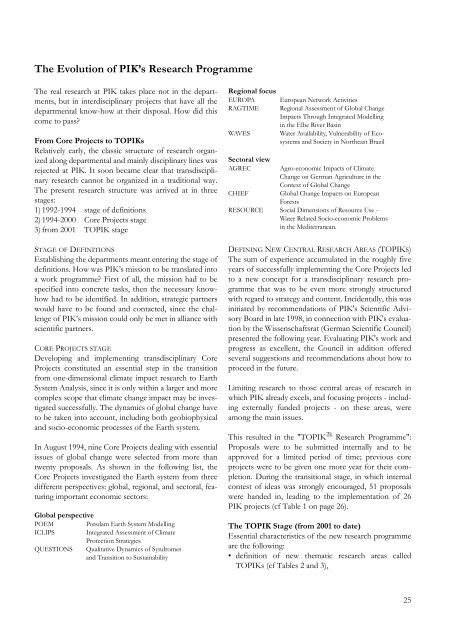PIK Biennial Report 2000-2001 - Potsdam Institute for Climate ...
PIK Biennial Report 2000-2001 - Potsdam Institute for Climate ...
PIK Biennial Report 2000-2001 - Potsdam Institute for Climate ...
Create successful ePaper yourself
Turn your PDF publications into a flip-book with our unique Google optimized e-Paper software.
The Evolution of <strong>PIK</strong>’s Research Programme<br />
The real research at <strong>PIK</strong> takes place not in the departments,<br />
but in interdisciplinary projects that have all the<br />
departmental know-how at their disposal. How did this<br />
come to pass?<br />
From Core Projects to TO<strong>PIK</strong>s<br />
Relatively early, the classic structure of research organized<br />
along departmental and mainly disciplinary lines was<br />
rejected at <strong>PIK</strong>. It soon became clear that transdisciplinary<br />
research cannot be organized in a traditional way.<br />
The present research structure was arrived at in three<br />
stages:<br />
1) 1992-1994 stage of definitions<br />
2) 1994-<strong>2000</strong> Core Projects stage<br />
3) from <strong>2001</strong> TO<strong>PIK</strong> stage<br />
STAGE OF DEFINITIONS<br />
Establishing the departments meant entering the stage of<br />
definitions. How was <strong>PIK</strong>’s mission to be translated into<br />
a work programme? First of all, the mission had to be<br />
specified into concrete tasks, then the necessary knowhow<br />
had to be identified. In addition, strategic partners<br />
would have to be found and contacted, since the challenge<br />
of <strong>PIK</strong>’s mission could only be met in alliance with<br />
scientific partners.<br />
CORE PROJECTS STAGE<br />
Developing and implementing transdisciplinary Core<br />
Projects constituted an essential step in the transition<br />
from one-dimensional climate impact research to Earth<br />
System Analysis, since it is only within a larger and more<br />
complex scope that climate change impact may be investigated<br />
successfully. The dynamics of global change have<br />
to be taken into account, including both geobiophysical<br />
and socio-economic processes of the Earth system.<br />
In August 1994, nine Core Projects dealing with essential<br />
issues of global change were selected from more than<br />
twenty proposals. As shown in the following list, the<br />
Core Projects investigated the Earth system from three<br />
different perspectives: global, regional, and sectoral, featuring<br />
important economic sectors:<br />
Global perspective<br />
POEM <strong>Potsdam</strong> Earth System Modelling<br />
ICLIPS Integrated Assessment of <strong>Climate</strong><br />
Protection Strategies<br />
QUESTIONS Qualitative Dynamics of Syndromes<br />
and Transition to Sustainability<br />
Regional focus<br />
EUROPA European Network Activities<br />
RAGTIME Regional Assessment of Global Change<br />
Impacts Through Integrated Modelling<br />
in the Elbe River Basin<br />
WAVES Water Availability, Vulnerability of Ecosystems<br />
and Society in Northeast Brazil<br />
Sectoral view<br />
AGREC Agro-economic Impacts of <strong>Climate</strong><br />
Change on German Agriculture in the<br />
Context of Global Change<br />
CHIEF Global Change Impacts on European<br />
Forests<br />
RESOURCE Social Dimensions of Resource Use -<br />
Water Related Socio-economic Problems<br />
in the Mediterranean.<br />
DEFINING NEW CENTRAL RESEARCH AREAS (TO<strong>PIK</strong>S)<br />
The sum of experience accumulated in the roughly five<br />
years of successfully implementing the Core Projects led<br />
to a new concept <strong>for</strong> a transdisciplinary research programme<br />
that was to be even more strongly structured<br />
with regard to strategy and content. Incidentally, this was<br />
initiated by recommendations of <strong>PIK</strong>'s Scientific Advisory<br />
Board in late 1998, in connection with <strong>PIK</strong>'s evaluation<br />
by the Wissenschaftsrat (German Scientific Council)<br />
presented the following year. Evaluating <strong>PIK</strong>'s work and<br />
progress as excellent, the Council in addition offered<br />
several suggestions and recommendations about how to<br />
proceed in the future.<br />
Limiting research to those central areas of research in<br />
which <strong>PIK</strong> already excels, and focusing projects - including<br />
externally funded projects - on these areas, were<br />
among the main issues.<br />
This resulted in the "TO<strong>PIK</strong> 2k Research Programme":<br />
Proposals were to be submitted internally and to be<br />
approved <strong>for</strong> a limited period of time; previous core<br />
projects were to be given one more year <strong>for</strong> their completion.<br />
During the transitional stage, in which internal<br />
contest of ideas was strongly encouraged, 51 proposals<br />
were handed in, leading to the implementation of 26<br />
<strong>PIK</strong> projects (cf Table 1 on page 26).<br />
The TO<strong>PIK</strong> Stage (from <strong>2001</strong> to date)<br />
Essential characteristics of the new research programme<br />
are the following:<br />
• definition of new thematic research areas called<br />
TO<strong>PIK</strong>s (cf Tables 2 and 3),<br />
25

















